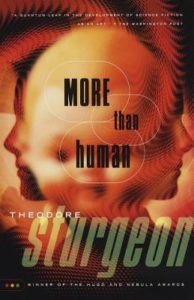 Sci-fi doesn’t get more psi-fi than Theodore Sturgeon’s More than Human. A group of five outcast and reclusive people chance together. Improbably, they all have psychic powers, such as telepathy and psychokinesis, and much else.
Sci-fi doesn’t get more psi-fi than Theodore Sturgeon’s More than Human. A group of five outcast and reclusive people chance together. Improbably, they all have psychic powers, such as telepathy and psychokinesis, and much else.
They range in age from an infant in a crib to a feral young man who wanders the forest. They more-or-less coordinate their superpowers so they can get along.
This is one of the earliest examples of a team of people with superpowers, a trope with history. Superman debuted in 1938, followed by The Flash, The Green Lantern, and a wave of others. Then teams of superheroes proliferated, such as Batman and Robin and The Justice Society of American.
Oddly, Sturgeon’s 1953 psychic team does not fight crime nor avenge injustice. They just live in an old house and eat and sleep, away from the public eye. Why do we care about them? The only reason is the strength of their individual characters, making this a kind of “literary” sci-fi.
In the opening third, the characters are well-drawn. The mood is dizzying, as the characters, who do not know what psychic powers are or that they have them, “hear” others’ thoughts and experience things popping in and out of existence. The writing is bold, with little explanation, trusting the reader to enjoy the ride and figure out what’s going on. The style recalls the woozy disorientation of P.K. Dick’s Ubik and Vonnegut’s Slaugherhouse Five (Vonnegut said he was influenced by Sturgeon).
When the feral young man is adopted by a dim-witted farmer, the relationship is poignant and compelling, but as the novel proceeds, relationships become perfunctory. The feral fellow goes missing and a replacement is found for the team of psychics, but the new guy is not well-developed. The team continues as before, doing nothing.
In an interesting story structure, narration jumps ahead in time to a new character in a psychiatrist’s office, plumbing his retrograde amnesia following the Korean War. The mid-century psychobabble is cringeworthy, but finally the character goes on a Jason-Bourne-like quest to discover the forgotten facts of his life. During this time, the original psychic team is completely forgotten by the narrator. That’s an interesting way to do a story: jump ahead then discover the beginning.
The ending seems hastily manufactured. When the psychic team is rediscovered, one member has inexplicably turned evil and the Bourne-like main character must defeat him. It’s never too late to get some conflict going.
The “moral” or the theme of the story is declared in a sentimental speech at the end. It’s mercifully short but it does bring up an interesting idea. What responsibility do superhumans have to ordinary humans? I struggle with this in my android stories.
Do AI beings have ethical obligations to their creators, either because they’re the creators, or because of some other bond? Do we need Asimov’s three laws to protect ourselves from androids or can we rely on the moral code any AI would naturally have? That’s a worthy psi-fi question.
Sturgeon, Theodore (1953/1999). More than Human. New York: Random House, 186 pp.